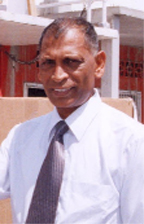– rehab programme sees 91 clients in first year
Minister of Health Dr Leslie Ramsammy said yesterday that the majority of Guyanese were involved in substance abuse, particularly alcohol.
And he estimated that between eight and ten percent of the national health care budget is spent on accident victims and treating injuries caused by persons who are hooked on some form of substance.

While there is a growing number of persons who are addicted to crack cocaine and marijuana, Minister Ramsammy said that a larger number is hooked on alcohol and tobacco.
The minister was at the time addressing a small gathering at the Georgetown Public Hospital (GPH) to mark the first anniversary of his ministry’s Drug Demand Reduction Programme (DDRP), which coincided with the observation of International Day Against Drug Abuse and Illicit Drug Trafficking. The DDRP has several centres in Berbice with the main one being at the GPH.
According to DDRP Coordinator Nicole Piggott, since its commencement the programme has seen some 91 clients with 27 being mostly addicted to tobacco, 33 to alcohol, 24 to marijuana and 22 to cocaine. However, many of the persons required help for multiple substance abuse, with only 24 using just a single illicit substance. The clients were between the ages of 18 and 67 years and eight of them were women.
“Drug rehabilitation is a multi-faceted, long-term process which usually requires the help of drug addiction professionals to help addicts manage their lives. To make a successful recovery the person must learn new skills in order to deal with situations and problems that would arise…,” Piggott said. The centre at the GPH is an outpatient clinic and it provides services every Tuesday between the hours of 3 pm to 5 pm. Persons requiring long-term in-patient services can get this at the Salvation Army or the Phoenix Recovery Project. Piggott said that some individuals have abused drugs for such an extended period that they require round-the-clock in-patient treatment for a period of six months.
Social problems
In his address, Ramsammy said substance abuse has caused a number of social problems in Guyana, pointing out that the growing domestic violence issue cannot be addressed without looking at substance abuse which is also the root cause of many road accidents. And while there are many persons in prison for trafficking in or using illicit drugs, he said, many of them are also incarcerated for committing violent crimes while under the influence of some substance. Sexual abuse of women and children is also linked to alcoholism.
The minister called on society to look around and see the grave impact of substance abuse and he said he would continue to speak about the issue and be “in people’s faces on the issue.”
While addiction to crack cocaine and other illicit drugs is becoming a major problem in Guyana, Ramsammy said several prescription drugs are also being abused. He named Valium as the chief drug that is being abused as it is too easy for persons to access it.
“It is an important drug but unfortunately around the world it is being abused,” the minister said while calling on the country’s pharmacists and pharmacies to follow the regulations when issuing drugs to members of the public.
“Pharmacists have to be more vigilant when issuing drugs,” the minister said adding the pharmacists are important people in delivering healthcare but when they don’t follow the rules then they just create misery for the populace.
He said it is very difficult for his ministry alone to address the substance abuse problem and as such every citizen needs to play his/her part. Schools and religious organisations also have their part to play in the fight.
DDRP centres are also located at the New Amsterdam Hospital, Smythfield Drop-in-Centre, Mibi-curi Cottage Hospital and the Skeldon Hospital. The ministry also has television and radio programmes that are aired weekly as well as a school initiative that sees recovering addicts perform skits for school children.
‘Humane approach’
Meanwhile, two local organisations yesterday said that with the launch of the United Nations 2009 World Drug Report more than 40 international groups and experts worldwide have called on governments to adopt a humane approach to drug policy. A release said the call was signed by a total of 46 people from a range of professional backgrounds, including economists, drug policy/harm reduction experts, AIDS and human rights activists among others.
“We need a more humane approach to drug use based on harm reduction principles and respect for human rights to eliminate the negative impact of the drug trade in Guyana,” Donna Snagg, President of the Juncata Juvant Friendly Society, said in yesterday’s release. Her society provides assistance to persons who are deported. “Old methods are not working so we must turn to more evidence-based approaches,” she said.
The release said millions of non-violent drug users are languishing in prisons as a result of current drug policies rather than receiving treatment.
“Laws and policies that drive drug users underground, keep people away from life-saving HIV services and allows AIDS to spread, said Co-Chair of the Society Against Sexual Orientation Discrimination (SASOD Joel Sampson. “These are very similar dynamics of exclusion which we see against sexual and gender minorities, and other marginalised groups,” he added.
A call was issued for governments to focus on reducing the harm of the drug trade and use.




